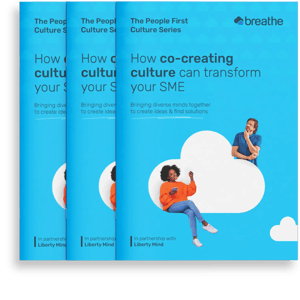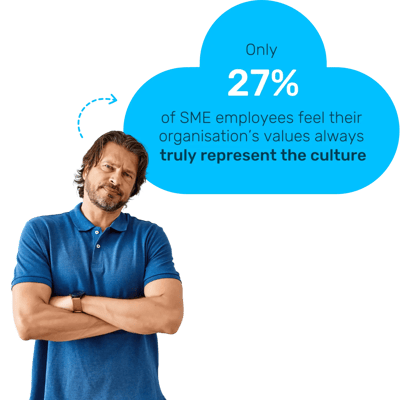Co-creating workplace culture - The People First Culture Series

Welcome to edition 4 of The People First Culture Series, where we discuss the benefits of co-creating workplace culture.
Whether you’re building your corporate culture from scratch or going through a much-needed reset, it’s time to understand the power of co-creation and how it works in practice.
Co-creation is about bringing your employees together to create a culture that best represents your business and ways of working. It’s an inclusive, participative approach to culture that helps ensure that all people can contribute and bring their diverse backgrounds, experiences and full selves into an organisation.
.webp?width=1296&height=1000&name=2%20page%20spread%20(1).webp)
More minds are better than one – the power of the collective is where co-creation becomes a driving force for positively changing culture at work.
Just like our previous editions, we’ve taken the time to gauge what other SME employees are thinking, from a recent survey amongst 1241 SME employees across the UK*. Less than half of SME employees have formal values set out in their organisations, which means there’s an abundance of opportunities to renew and revisit where you’re at.
From hosting workshops to bring your people’s values together, to ditching managerial privileges and creating community spaces, this playbook is packed with takeaways, from Company Culture Coach, Lizzie Benton.
Read the full report to learn how your business can implement co-creation to build an employee culture that’s fit for the future...
Whenever we think about creating a culture at work, the first place we begin is with values – what values do we all agree are important enough that we’ll hold both ourselves and our work accountable to them?
The top-down approach to creating values - where leaders decide on company-wide values and then push them down onto others in the business - is outdated. This has been discovered in our own data, as 51% of SME employees are not involved at all in creating their organisation’s values.
When the creation of values comes from only the top management, a natural bias exists. According to our survey, only 27% of SME employees feel their organisation’s values always truly represent the culture.
When we get to be heard, make a contribution, and participate in the creation of company values and culture, we’re far more likely to feel a sense of ownership and connection with the things we’ve created.


We need as much diversity as possible when co-creating. We need diversity of experience, thought, background and roles. All voices matter and all should be heard when we’re creating our company culture.
Many companies claim to be working on diversity, and some even have diversity as a company value, yet the way they work says otherwise. Only 24% of SME employees strongly agree that diversity is valued in their organisation.
If businesses can’t honour diversity in the basic creation of company values, there’s no way they’re also operating in a diverse and inclusive manner in their day-to-day work.
Opening up participation and creating an environment where people feel they can contribute is how you begin to foster diversity in your company.
The ability to co-create a strong culture comes with a caveat: you need an existing environment in your business that values - and acts upon - ideas and opinions from across the organisation.
In many organisations there is a tendency to overvalue the opinions and ideas of those who hold a higher position or title than others - their power is given more weight than their content. From our research, this rings true, as 38% of SME leaders have their new ideas for company culture and/or values listened to more than any other employee.
Co-creation requires a business to see all ideas as equally important. Every voice is part of the puzzle, and when we don’t have all of the pieces we put the business at risk of being blind to competitors, challenges and even emerging trends.
When we create a culture where everyone can share and contribute their ideas, employees are more engaged in their work and motivated to find solutions for business problems. People feel connected to the company and want to nurture the culture themselves.

*Opinium Research was commissioned to conduct a nationwide online survey of 1241 adults working in UK SMEs. The survey was issued during the 21st – 25th July 2023. The data in this guide focuses on SMEs with 10-249 employees.

